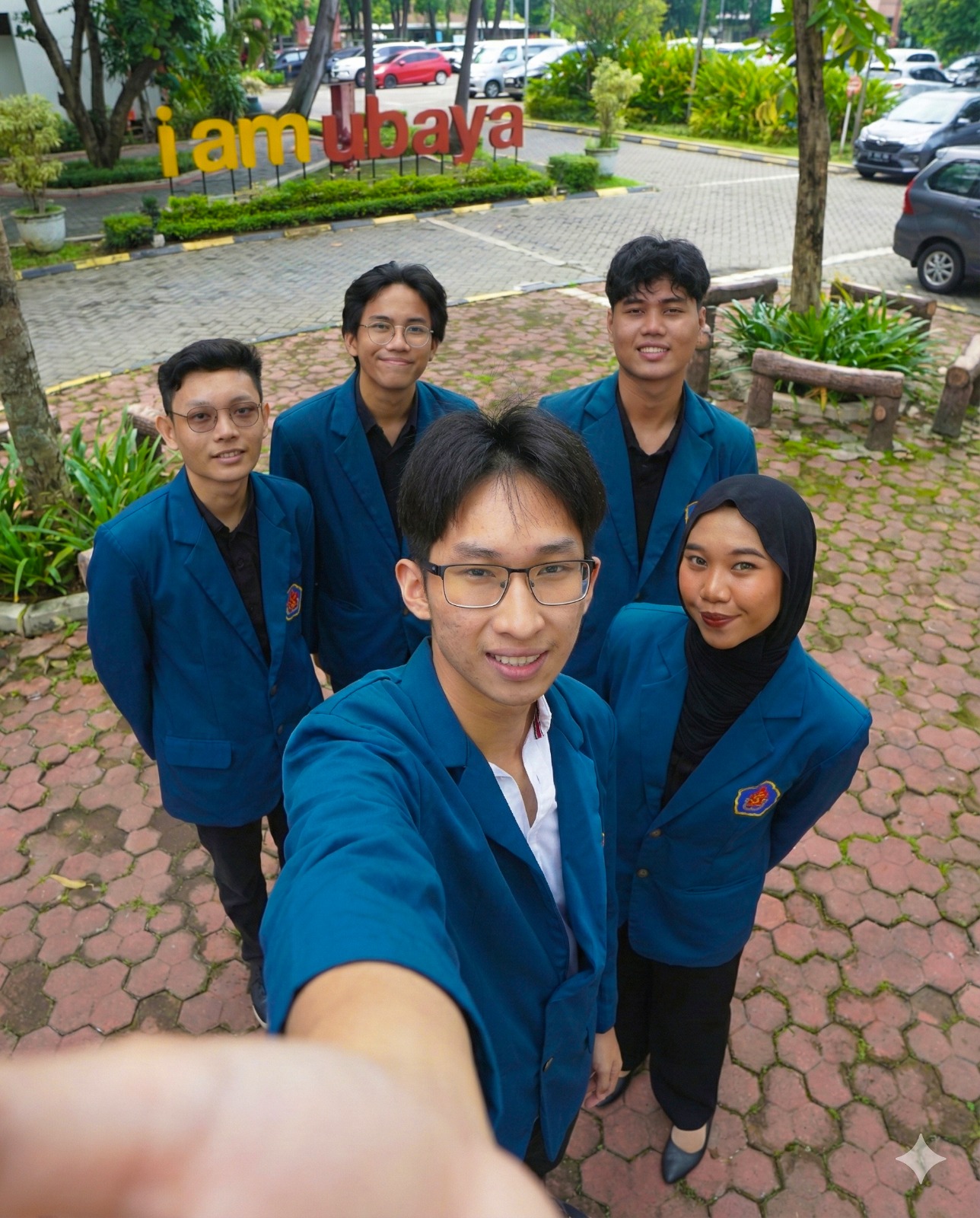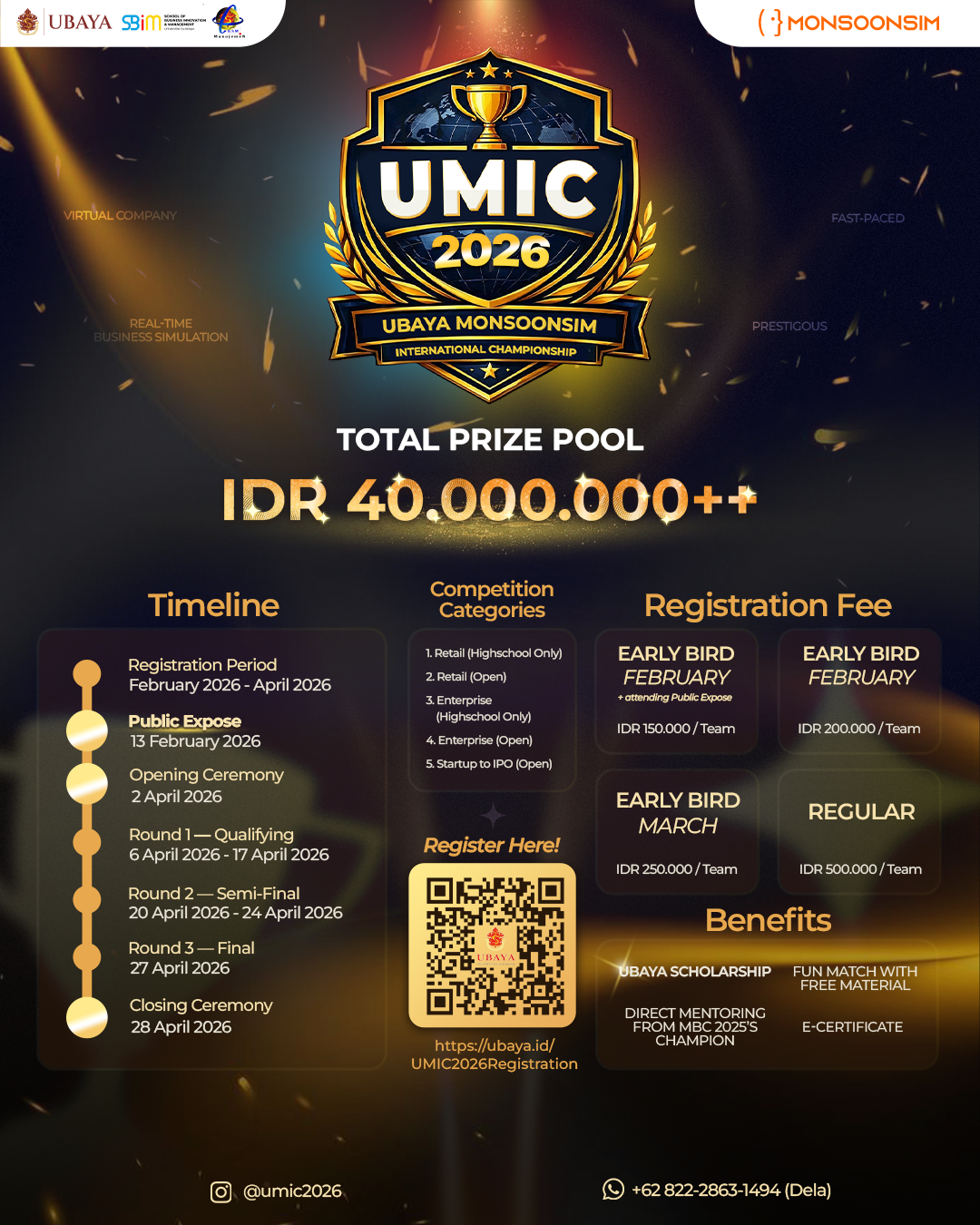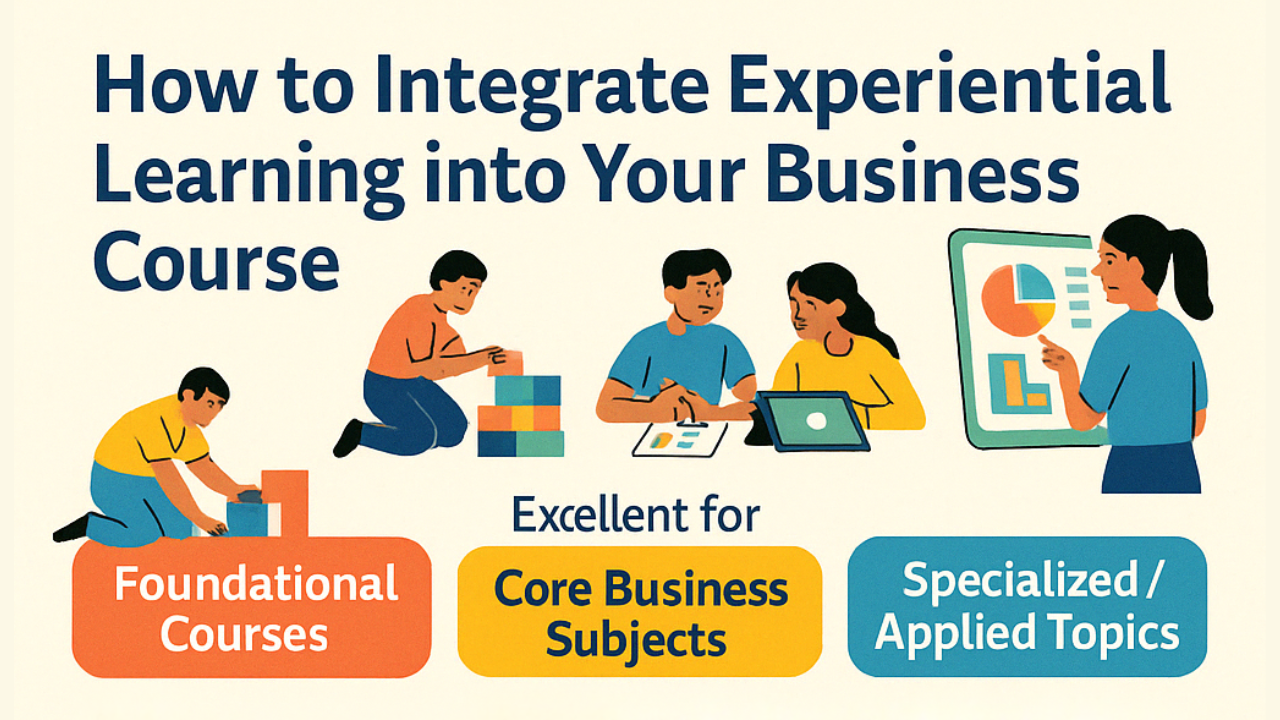How to Teach and Learn Accounting with Simulation
Feb 02, 2026
- Teaching and Learning Accounting the “MonsoonSIM way”
- Diving Deep with MonsoonSIM's Finance Module
- The MonsoonSIM Learning Model for Accounting
- New Accounting Enhancements in MonsoonSIM V12
- The Knowledge Build Up with Business Simulations.
- Features and Benefits of MonsoonSIM's Assessment Tools
- Innovative Learning Methodologies through MonsoonSIM
- Blended Learning Environment
- Experience MonsoonSIM: Book Your Free Trial Today
- Frequently Asked Questions: Accounting Teaching
Article Summary
| Questions students should think about in Accounting, especially in retail accounting. |
| MonsoonSIM's workshop on retail accounting with business simulations. |
| MonsoonSIM's Finance Module offers hands-on accounting experience, integrated reporting, money management, and financial intelligence. |
| The MonsoonSIM learning model emphasizes competition, strategy, and real-world application. |
| Five important learning points from retail accounting: increasing assets, relating assets to revenues, increasing sales, achieving profit goals, and reducing expenses. |
| The importance of collaboration and teamwork in the MonsoonSIM simulation. |
| MonsoonSIM offers a tailored learning experience, allowing educators to choose specific features for their simulation. |
| MonsoonSIM aims to simplify the teaching and learning of business concepts, including retail accounting. |
When one learns Accounting, there are a few questions students should consider.
For example - which areas are the business’s greatest spending? Where can we cut costs? Where should we best invest in?
These questions are especially important in retail accounting. Accounting for retail is dependent on inventory costs, sales tax, and considerations to payroll management, among others.
Teaching and Learning Accounting the “MonsoonSIM way”
MonsoonSIM conducted its first-ever retail accounting with business simulations workshop on, the 7th of June. Over 45 participants were introduced to the idea of exploring teaching with simulations. In addition, we explored how learning by doing empowers students.
The webinar discussed teaching Accounting by letting teachers configure the simulation environment and by giving the students the opportunity to explore by running their own business.
With such an exciting and relevant topic, this blog will help you catch up with the discussion and ensure that you’re in the know.
Revolutionize your accounting education strategy with MonsoonSIM's innovative approach to teaching and learning accounting.
Diving Deep with MonsoonSIM's Finance Module
MonsoonSIM's Finance Module is not just a simulation tool; it's a comprehensive learning platform. It empowers students to navigate the intricate waters of financial management, blending theory with real-world application. Here's a glimpse into what learners can expect:
- Hands-on Accounting Experience: Moving beyond the confines of textbooks, the module offers both Cash and Accrual accounting methods. Learners get to engage directly with tasks like recording transactions, maintaining balance sheets, and deciphering profit and loss dynamics.
- Integrated Reporting: The modern business world demands transparency and effective communication. MonsoonSIM introduces learners to integrated reporting, teaching them the art of conveying financial health and value to stakeholders.
- Money Management in Action: Financial prudence is a skill best learned through practice. Whether it's optimizing profits, understanding bank overdrafts, or exploring loan options, students get a firsthand experience of managing finances in varied scenarios.
- Harnessing Financial Intelligence: Beyond traditional accounting, the module takes learners on a journey of financial analysis, introducing them to key metrics, performance indicators, and decision-making tools.
MonsoonSIM's Finance Module is not just a simulation tool; it's a comprehensive learning platform. It empowers students to navigate the intricate waters of financial management, blending theory with real-world application.
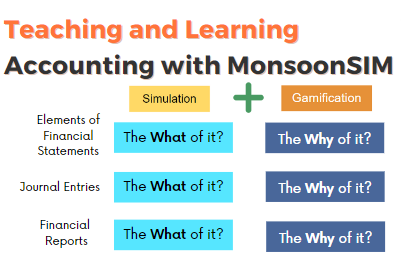
The MonsoonSIM Learning Model for Accounting
To give a better overview of what can be expected in teaching retail accounting with the dual-mode of teaching, this brings us to the MonsoonSIM learning model.
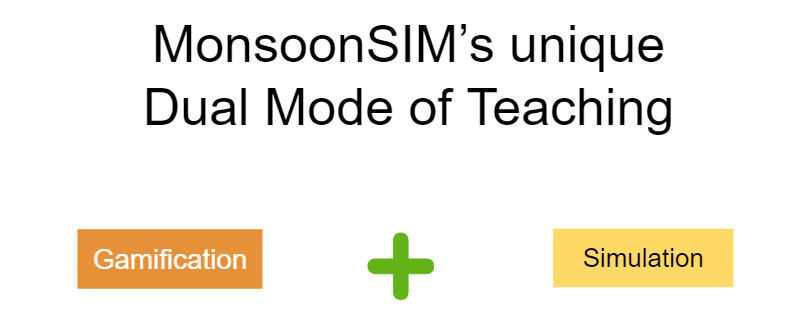
MonsoonSIM's Approach to Accounting Education
| Practical, hands-on accounting experiences. | Focus on both Cash and Accrual accounting methods. |
| Introduction to integrated reporting practices. | Customizable features for a tailored learning journey. |
Explore the comprehensive simulation experience of financial management with our Finance (FIN) Module article, offering insights into money management, accounting practices, and financial analysis within a business context.
The underlying motivation for learners when running their own “virtual” company within MonsoonSIM’s business simulation platform is to win. Competing against robots, other teams, and a challenging configured environment, learners experience the thrill of pitting their own business strategy and insights against those of the competing firms.
This need to win, which is sustained through a need to be profitable and a need to avoid bankruptcy, further drives other needs too, as outlined below.
The beauty of the MonsoonSIM approach lies in its ability to offer a realistic environment. Students aren't just learning about financial concepts; they're living them. From managing a virtual company's finances to competing in a simulated market, the learning curve is both challenging and rewarding.
For educators, MonsoonSIM serves as a versatile tool. They can tailor the simulation to fit specific learning objectives, ensuring that students not only grasp theoretical concepts but also understand their real-world implications.
If you're curious about MonsoonSIM's approach to experiential learning for check out our take on Business Experiential Learning here.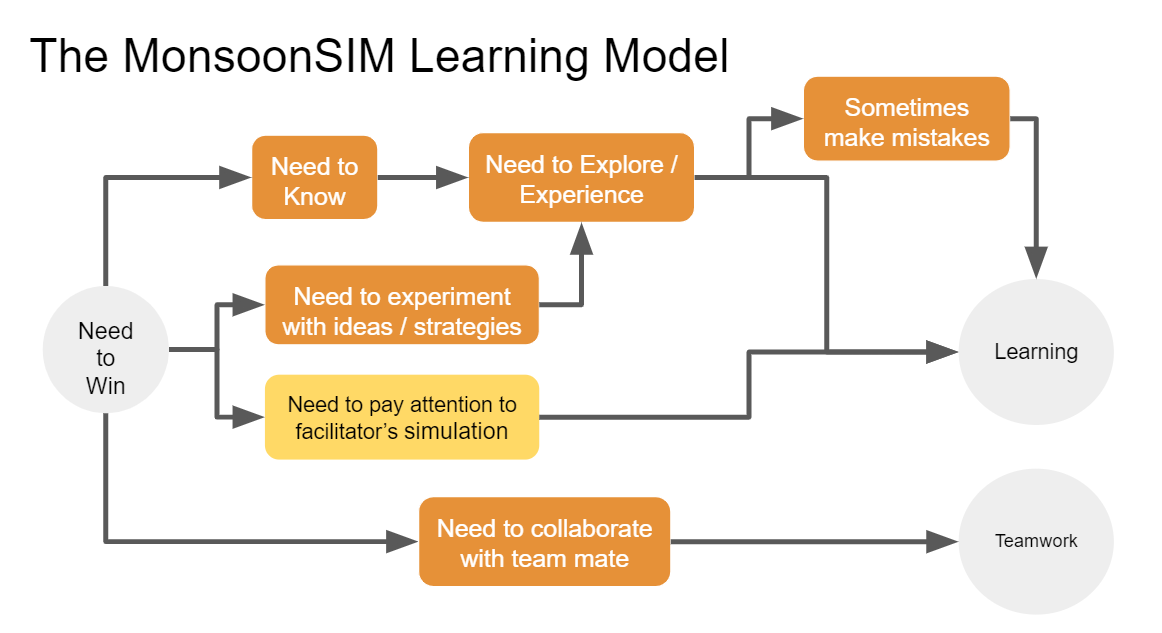
Need to Know
Throughout the business simulation, learners face a constant need to know of their company’s situation both internally and externally. These questions often sound like this: What are the best strategies to execute in retail accounting? What are the factors we need to take into consideration?
Explore how MonsoonSIM revolutionizes education through gamified learning, making complex business concepts accessible and engaging. Dive into the transformative approach that MonsoonSIM employs to blend critical thinking, strategic planning, and fun in a comprehensive learning experience.
The five most important learning points from retail accounting are as follows:
1. How to increase assets
2. How assets relate to revenues
3. How to increase sales
4. How to achieve profit goals
5. How to reduce the expense
Embark on an enlightening journey to elevate your financial literacy and skills with MonsoonSIM's immersive accounting business simulation, where practical learning meets innovation.
Need to pay attention to the facilitator’s simulation
For students, there is the need to pay attention to the teacher’s configured simulation. Both external and internal analysis is relevant to draw insights from observations, to investigate the effectiveness of the student’s strategy.
With learning a specific area such as retail accounting, students need to watch their external factors, such as the departments that are on, the peak and drop in demand due to macro-economic factors, and many more which can all be configured.
As for internal analysis, learners need to be aware of their starting and ongoing financial position, along with the internal operations.
The combination goes a long way to explaining how your company’s actions have succeeded or failed, and how to improve next time.
The specific configurations of the simulated environment are a variable puzzle especially made for the learners. This is the perfect opportunity for them to draw on and practice common business analysis tools, such as the SWOT matrix, Porter’s 5 Forces, and countless others.
Explore what sets MonsoonSIM apart from conventional educational simulations, and understand the innovative edge that makes it a leader in experiential learning.
Need to explore and experience
Once ideas and strategies are tested out, this enables learners to directly observe what is successful and what needs further improvements. The end result is reevaluating, revising, and refining your ideas and strategies until it becomes well-grounded and robust.
A need to know about retail accounting concepts also enforces a need to explore and experience it for themselves. Further understanding can be grasped as learners discover how to change retail prices, how to change rental contracts, and how to lower costs by buying in bulk.
However, this is more than just developing an understanding of the “how-to” of things. While at a glance it does seem like merely clicking a button and interacting with the intuitive user interface of the MonsoonSIM platform, it goes much deeper than that.
With each decision made on retail prices, the number of stores, rental contract terms, and bulk purchases, learners can find out the impact of that on company performance and KPIs.
For example, setting retail prices is an opportunity to put into practice the pricing strategies learned in classrooms (markup, cost leader, etc.). Lowering costs by buying in bulk is a perfect example of the concept of economies of scale.
Certainly, there is a risk of sometimes making mistakes. This can be because of buying too little or too much, running out of cash or inventory, misreading the market demand, misjudging the competitors, and countless other factors.
However, as your experience in the business simulation progresses, you can reflect on these mistakes and learn from them.
If you care about teaching applying business strategy read on how we're encouraging strategic thinking here:
Need to collaborate with teammates
Considering that learners operate their “virtual” companies in teams, there is a need to collaborate with teammates for a chance to win. This might not tie in directly with learning retail accounting concepts, but teamwork remains an important and relevant soft skill needed in the labor market.
Most jobs students face upon graduation are within an organization, which means working with others. Graduates will have to collaborate and also sometimes face the conflicts and creative differences that come from it.
Students collaborating within MonsoonSIM’s simulation will develop a further understanding of why managing a retail business isn’t easy. They will realize teamwork is important for cash control, proper financial reports, and for overall firm performance.
Teamwork is a critical skill in the labor market; see how MonsoonSIM fosters this through collaborative simulations.
New Accounting Enhancements in MonsoonSIM V12
MonsoonSIM V12 brings several new features and enhancements that significantly improve the accounting learning experience:
Journal and Financial Enhancements
- Comprehensive Financial Features: MonsoonSIM V12 includes comprehensive financial features such as journal adjustments, bank reconciliation, and detailed management reports. These tools help students understand complex financial operations and enhance their accounting skills.
- Journal Adjustments: Facilitators and learners can now make detailed journal adjustments, allowing for a deeper understanding of how transactions affect the overall financial statements.
- Bank Reconciliation: This feature introduces students to the critical process of reconciling company records with bank statements, highlighting the importance of accuracy in financial reporting.
- Detailed Management Reports: Enhanced reporting capabilities provide learners with access to a wide range of financial reports, including profit and loss statements, balance sheets, and cash flow statements, enabling them to analyze financial health comprehensively.
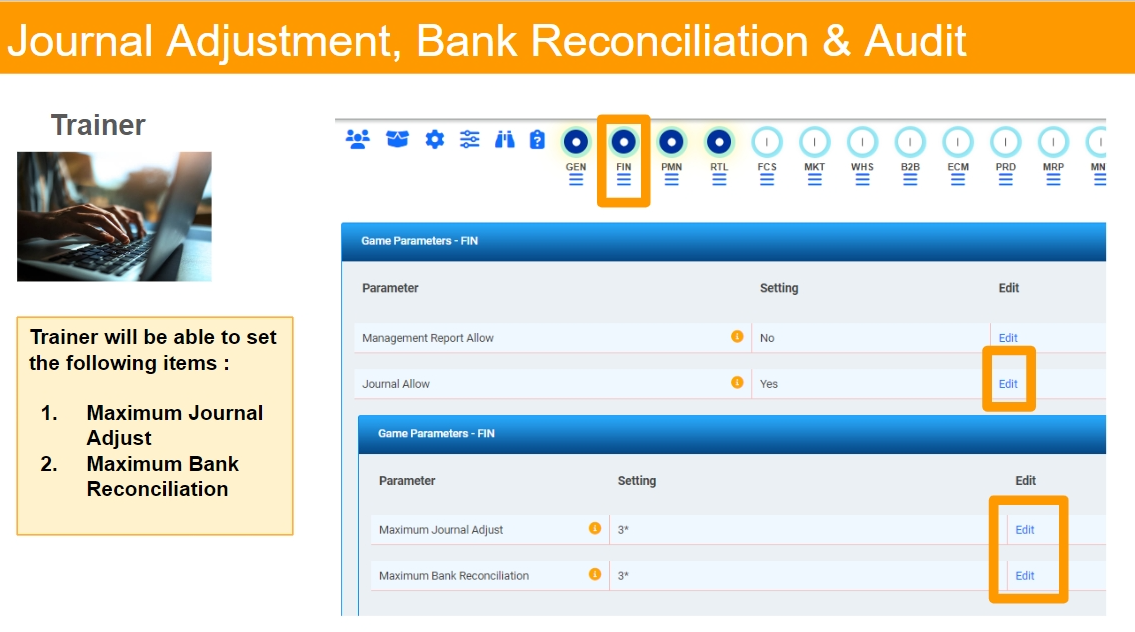
Enhanced Step-Through Mode
- Flexible Pace: The new "Step-Through Mode" allows facilitators to run the simulation day-by-day at their own pace without a countdown clock. This feature is particularly useful for detailed discussions and in-depth analysis, providing a more flexible and controlled teaching environment.

Improved Learner Monitoring
- Activity Monitoring Slider: This new tool provides a more intuitive way to track student engagement and progress over time. Historical data is available, enabling facilitators to assess performance trends and intervene as necessary.
Enhanced Boz AI
- Interactive Guidance: The upgraded Boz AI includes several improvements such as a slider interface for easier access to help and resources, replacing the need for a new page, and enhanced responses and more intuitive guidance, making it easier for both learners and facilitators to get the support they need quickly.
The Knowledge Build Up with Business Simulations.
Teaching retail accounting with MonsoonSIM is both convenient and simple because the simulation and gamification can be tailored to your exact classroom needs. Teachers as facilitators can decide whether to include certain simulation features, such as procurement, human capital management, vendors, accrual accounting, the initial cash of each company, and so much more!
As more features and components of a business are incorporated within the simulation (as per the teachers’ discretion), this leads to a gradual knowledge build-up. For example, learners can acclimatize themselves first to an understanding of revenues, followed by overhead then purchasing, and so on. More concepts can be demonstrated and experienced afterward, such as current ratio, credit ratings, bankruptcies, and others.
Explore the Revolutionary Approach to Accounting Education with MonsoonSIM: Uncover Innovative Strategies and Practical Insights for Making Accounting Engaging and Accessible
Features and Benefits of MonsoonSIM's Assessment Tools
One of the standout features of MonsoonSIM is its robust assessment system, designed to provide a comprehensive evaluation of learners' understanding and application of business concepts. Here’s why MonsoonSIM leads the way in business simulation for education:
Interactive Quizzes and Performance KPIs
MonsoonSIM incorporates interactive quizzes that are seamlessly integrated into the simulation. These quizzes are designed to test learners’ knowledge and application of business principles in real-time, providing immediate feedback and fostering a deeper understanding of the material.
- Real-Time Quizzes: Facilitators can deploy quizzes during the simulation to assess learners' comprehension and decision-making skills on the fly.
- Performance KPIs: MonsoonSIM tracks various Key Performance Indicators (KPIs) that reflect learners' performance in different aspects of the simulation, such as financial management, operational efficiency, and strategic decision-making. These KPIs provide detailed insights into each learner’s strengths and areas for improvement.
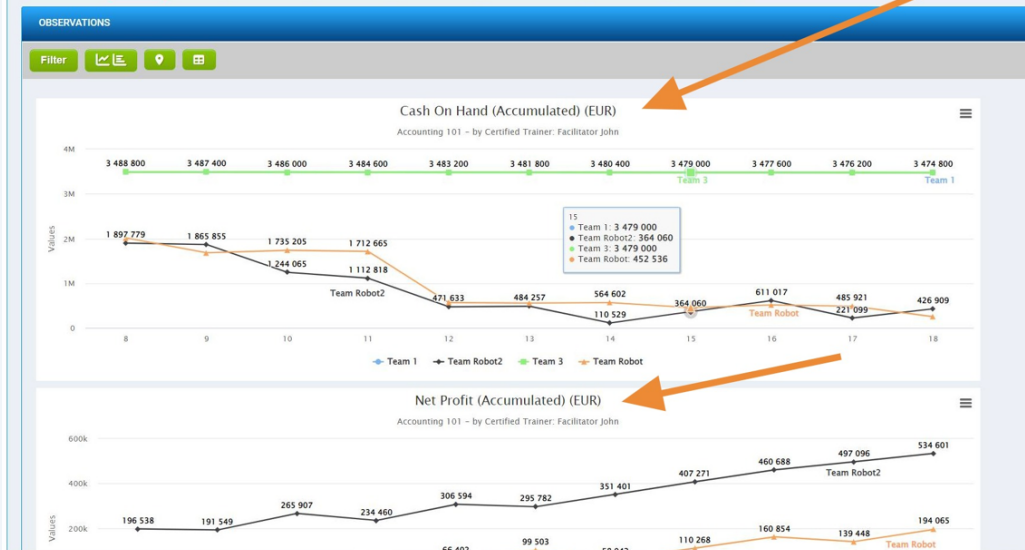
Personalized Assessments
MonsoonSIM offers facilitators the flexibility to create personalized assessments tailored to specific learning objectives and individual learner needs. This customization enhances the relevance and impact of the learning experience.
- Custom Scenarios: Facilitators can design custom scenarios and assessments that align with their curriculum and educational goals. These scenarios can be adjusted to reflect specific industry challenges or educational focuses.
- Reflection Assessments: After completing the simulation, learners can participate in reflection assessments. These assessments encourage learners to reflect on their decisions, analyze outcomes, and understand the implications of their actions in the simulation. This reflective practice is crucial for deep learning and personal growth.
- AI-Enhanced Support: MonsoonSIM’s Boz AI supports facilitators in creating and administering these personalized assessments by providing tailored advice and resources based on the specific needs of the learners and the objectives of the course.
Real-Time Monitoring and Detailed Feedback
MonsoonSIM provides real-time monitoring tools and detailed feedback mechanisms that help facilitators track learner progress and intervene when necessary.
- Activity Monitoring Slider: This feature allows facilitators to monitor student engagement and performance throughout the simulation. Historical data is available to track progress over time and identify trends.
- Comprehensive Reporting: Detailed reports are generated on various aspects of learner performance, including financial metrics, operational efficiency, and strategic outcomes. These reports help facilitators provide targeted feedback and support.
Here's a guide on running MonsoonSIM optimally in your course
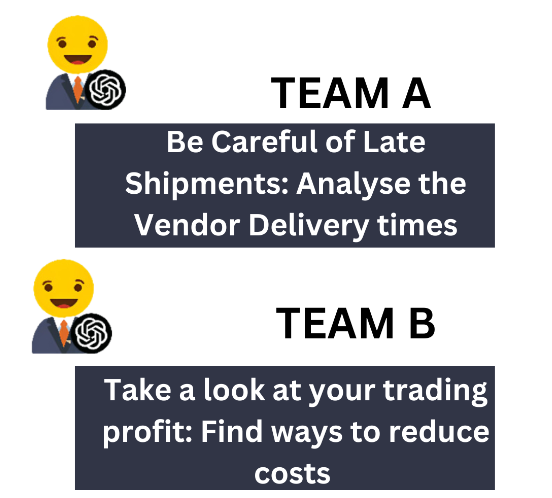
Innovative Learning Methodologies through MonsoonSIM
MonsoonSIM is revolutionizing the way educators and institutions teach accounting by integrating business simulation games into the curriculum. This experiential learning platform blends theory with practical application, fostering a dynamic learning environment conducive to student engagement and knowledge retention. Here are key aspects of how MonsoonSIM enriches the teaching and learning of accounting:
1. Gamification of Learning
Interactive Scenarios:Students navigate through various accounting scenarios, such as budgeting, financial reporting, and auditing. By making decisions that directly affect virtual businesses, they learn the implications of their actions in a realistic setting.
Competitive and Collaborative Learning:The platform encourages both competition and collaboration among students. They can compete to achieve the best financial results or collaborate to solve complex accounting problems, driving peer learning and teamwork.
Immediate Feedback:Participants receive instant feedback on their financial decisions, reinforcing learning through the immediate application of accounting concepts. This helps students quickly understand where they went wrong and how to correct it.
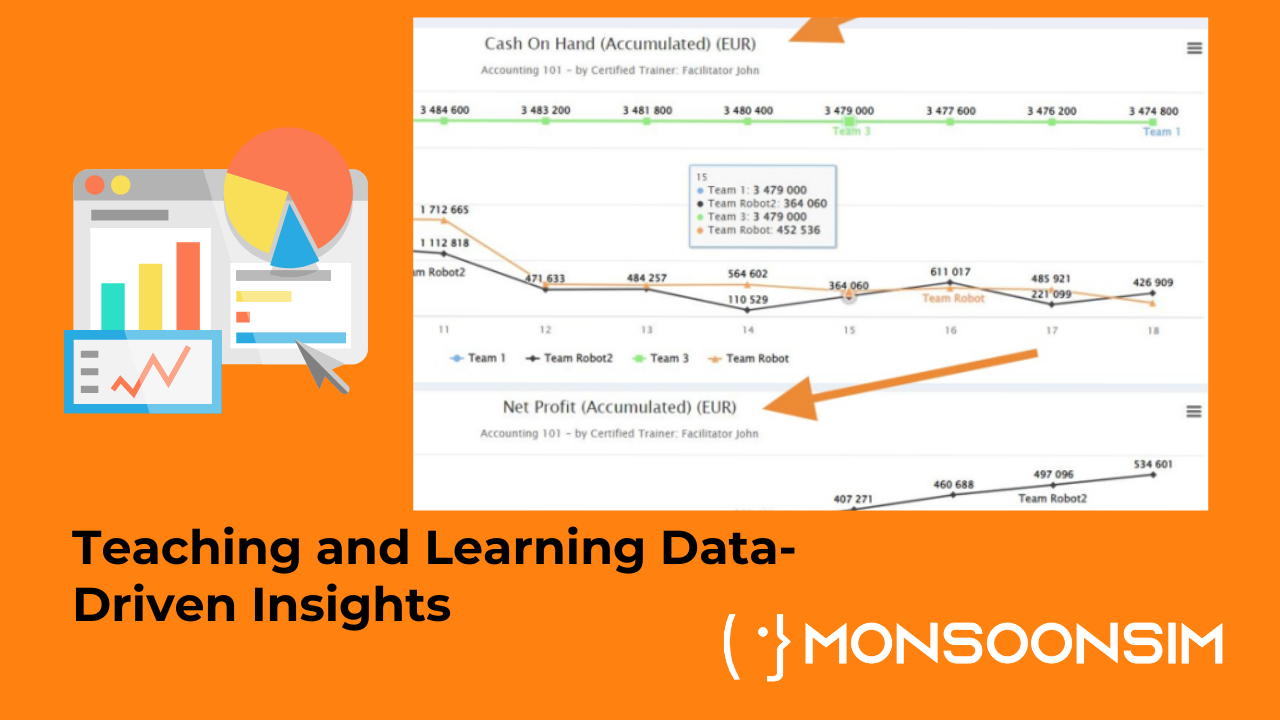
Blended Learning Environment
Classroom Integration: MonsoonSIM can be seamlessly integrated into classroom activities, combining traditional lectures with hands-on simulation exercises. For example, after a lecture on financial statements, students can immediately apply what they’ve learned in a simulated environment.
Remote and Hybrid Learning:The platform supports remote learning, making it ideal for hybrid classroom setups where students can engage in simulations from anywhere. This flexibility ensures that all students, regardless of location, can participate fully.
Customizable Modules: Educators can tailor the simulations to complement their course objectives and learning outcomes. For instance, they can focus on specific accounting topics like cost accounting or financial analysis, adjusting the simulation’s complexity to match the students’ level.
Data-Driven Insights for Curriculum Design with MonsoonSIM
MonsoonSIM generates a wealth of data that can be harnessed to drive data-driven insights for curriculum design in accounting. By analyzing student interactions and performance within the simulation, educators can gain valuable information to refine and enhance their teaching strategies. Here are some ways MonsoonSIM provides data-driven insights:
| Student Decision Patterns | Identifies common decision-making approaches | Tailoring content to address misconceptions |
| Performance Metrics | Assesses individual and group performance | Designing interventions for struggling students |
| Engagement Levels | Measures student engagement and participation | Enhancing interactive elements to boost engagement |
Final Thoughts
MonsoonSIM’s goal at the end of the day is to make any business concepts easier to teach and learn and to provide the options for more to teach and learn. The area of retail accounting in businesses is no different, and MonsoonSIM endeavors to maximize the understanding and learning experience for all learners worldwide.
For further information about how to teach and learn retail accounting with simulations, you are always welcome to contact us here: anisa@monsoonsim.com
To catch up on the previous event, watch the video below.
The beauty of the MonsoonSIM approach lies in its ability to offer a realistic environment. Students aren't just learning about financial concepts; they're living them. From managing a virtual company's finances to competing in a simulated market, the learning curve is both challenging and rewarding.
Don’t forget to stay tuned for our other upcoming workshops, which are just as promising as this episode on retail accounting!
Experience MonsoonSIM: Book Your Free Trial Today

Visit our Free Trial page to explore firsthand how MonsoonSIM can transform your teaching or training environment. This trial invites educators and business professionals to engage with our comprehensive business simulation platform, enabling you to integrate practical, hands-on business management and ERP scenarios into your curriculum. Experience the effectiveness of learning through simulation and see the real-time benefits it can bring to your educational strategies.
Start your journey by booking your free trial today.
Frequently Asked Questions: Accounting Teaching
What is MonsoonSIM and how does it aid in learning accounting?
Answer: MonsoonSIM is a comprehensive learning platform that uses business simulations to teach accounting and other business concepts. It provides a realistic environment for students to apply theoretical knowledge in a virtual business setting.
Who can benefit from using MonsoonSIM for accounting education?
Answer: MonsoonSIM is ideal for educators and students in the field of accounting and business studies. It is designed to enhance the learning experience for those seeking practical, hands-on experience in financial management and accounting.
What are the key features of MonsoonSIM's Finance Module?
Answer: The Finance Module in MonsoonSIM offers features like hands-on accounting experience with both Cash and Accrual accounting methods, integrated reporting, money management simulations, and tools for financial analysis. Check out our finance module here
How does MonsoonSIM simulate real-world accounting scenarios?
Answer: MonsoonSIM simulates real-world scenarios by allowing students to manage the finances of a virtual company, make strategic decisions, and compete in a simulated market, thus bridging the gap between theory and practical application.
Discover the transformative educational impact of MonsoonSIM at Michigan State University, a case study in leveraging cutting-edge simulations to enhance learning outcomes.
Can MonsoonSIM be customized for different educational needs?
Answer: Yes, educators can tailor MonsoonSIM simulations to fit specific learning objectives and choose from various features to align with their curriculum and teaching goals.
What are the learning outcomes of using MonsoonSIM for retail accounting?
Answer: Students learn key concepts like increasing assets, relating assets to revenues, sales strategies, achieving profit goals, and cost management. They also develop skills in strategic thinking, decision-making, and teamwork.
Embark on an enlightening journey to elevate your financial literacy and skills with MonsoonSIM's immersive accounting business simulation, where practical learning meets innovation.
How does MonsoonSIM encourage collaboration and teamwork?
Answer: In MonsoonSIM simulations, students work in teams to operate their virtual companies, which fosters collaboration, communication, and the handling of creative differences and conflicts, mirroring real-world business environments. Find out more about how we support teamwork and collaboration
Is there support or training available for educators new to MonsoonSIM?
Answer: MonsoonSIM provides resources and support for educators, including workshops, webinars, and comprehensive guides to help them effectively integrate the platform into their teaching.
Follow Us

Featured News

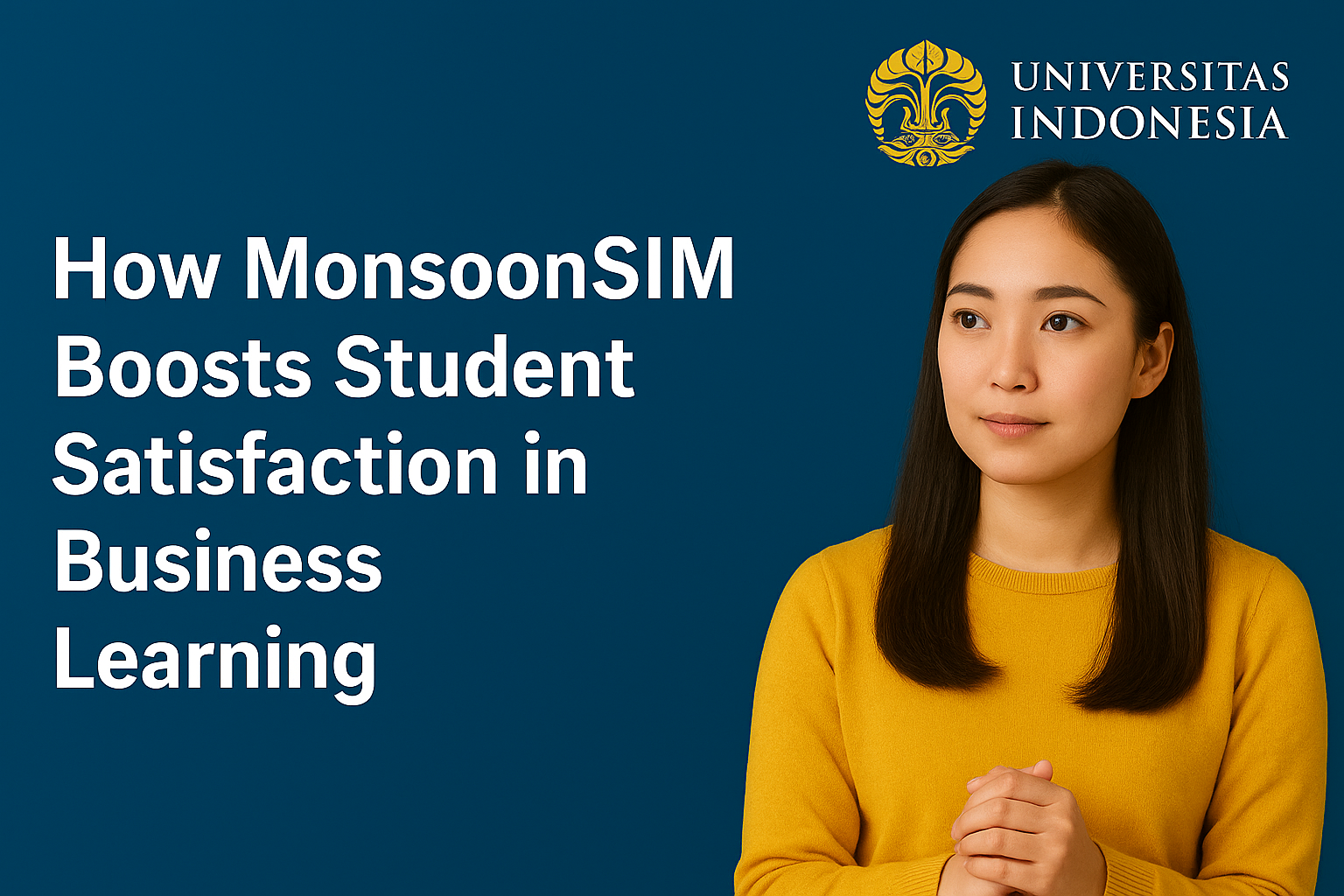
Latest News


